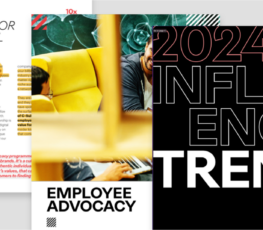Social media can still be one of the toughest things for many businesses to embrace and master. Sure, over the last few years a social media strategy has become the norm for marketing teams to implement.
Yet, with algorithm changes affecting brands content (Looking at you, Facebook), new social platforms popping up, and trying to understand where your best prospects are — social media is not taken lightly.
Initially, early adopters used it mostly to share light-hearted, fun content, but now businesses are still figuring out how to optimize it to drive strategic business goals. Even now after the growing importance of being on social media, many businesses are quite reluctant to get their employees involved with their social media initiatives. However, this mindset among companies and leadership is starting to change.
Plus, getting employees active on social has been a slow process and many companies simply still don’t understand the value that employees can bring or, worse, are still paranoid about headaches their employees could cause on social media.
But the reality is that employee participation on social media – known as employee advocacy – offers a powerful opportunity for businesses to exponentially expand the reach of their social media initiatives and, perhaps best of all, to do it using the employees they already have on the payroll.
Through employee advocacy, employees learn to share and post content on their personal social media accounts that can significantly broaden the reach of their employer’s brand and message. While employees being active on social has many advantages, here are some of the important points of allowing employees to help shape the corporate conversation through social media.
Employees merge a personal pastime with professional goals
No matter how hard a business works to keep employees off social media while at work, the strategy never works well. Instead, when businesses embrace social media and encourage employees to use it to advance strategic business goals, it’s no longer a losing battle to keep these employees off social media.
These same employees are now using their personal social media accounts – and the time they were once “wasting” on social media – to think strategically about how to use their unique, personal followings on social media to advance their business interests.
Simply put, it’s a win-win situation.
Employees evolve into thought leaders
Thought leaders are the social media-savvy employees who begin developing their own unique followings by writing about news and trends within their industry. And thought leadership organically develops through participation in corporate social media initiatives.
As employees gain more confidence and experience sharing and posting company content, they develop their own voice and judgment about how to convey to others what is most interesting, relevant and timely within a particular industry.
Not every employee will want high visibility online, but by sharing and engaging via social on behalf of their company, they organically start building a trusted personal brand with their networks. Plus, it also helps build their knowledge and improve their career worth.
Activate Your Team to Share and Create Content on Social Media 🚀
Give your company a competitive edge and your team a professional boost. Try EveryoneSocial's employee advocacy platform for FREE.
Employees protect and defend the brand
Social media is a place for anyone with an Internet connection to dish out unfiltered, uncensored chatter. For businesses, that means they can become the targets of unfair, incomplete, irresponsible, skewed criticisms and disparagement on social media.
Hence, when a business can count on a team of skilled employee advocates to help shape and reshape social-media chatter, the business stands much better odds of being able to control and bring balance to what’s being said. This also aligns with reviews about your product, software, or services. Employees can quickly comment, respond, and show their concern for customers and what people are saying.
Of course, you will still have unhappy people and potential internet trolls via social or review sites, but prospects seeing employees being proactive, responsive, and sharing content can help keep the level of transparency and positivity flowing.
Employees become powerful marketers, sellers, and recruiters organically
A company full of social brand advocates who are encouraged to participate in online conversations naturally become power marketers, sellers, and recruiters.
No matter what department the employees are in, they (without potentially realizing it) act as an extended branch to your company’s sales, marketing, and human resources. Social sharing and engaging with your corporate handles are of course important, but the human-to-human connection is more effective and trusted.
- 84% of people trust recommendations from friends, family, colleagues over other forms of marketing. (Nielsen)
- 33% of buyers trust the brand whilst 90% of customers trust product or service recommendations from people they know (Nielsen Global Online Consumer Survey)
Because there is a more personal connection to their networks, employees that are sharing content and engaging in social conversations are not only helping the corporate brand visibility but generating more business for their company.
It will (and should) feel more natural and employees shouldn’t feel like they are just promoting their company’s product or services every day. Employees spamming their networks is not going to drive great results or help the corporate conversation in a positive way, so some social policy will need to be in place.
Yet, there is no better way to boost and shape the corporate conversation, while enhancing lead quality, helping drive more revenue, and increasing the talent pool than getting your workforce from all different departments active in social conversations.
Final Thoughts
Businesses that learn to let go of their nervousness about employee participation on corporate social media are poised to immediately being taking advantage of the many benefits of employee advocacy.
It’s why companies like Dell have encouraged employees to get active on social and now have over 10,000 employees on social media to help boost their brand and shape the corporate conversation.
A lot of times large and corporate businesses are not seen as trustworthy from external audiences, whether fairly justified or not. However, employees that are encouraged to participate in the social conversations can improve those potential negative impressions and help grow the business at the same time.
Indeed, employees who become effective social-media advocates will become key players in achieving strategic business goals, merge their personal pastime with professional interests, evolve into thought leaders, protect and defend the brand over the long term, and organically become key to the growth of marketing, sales, and recruiting.
















